International Business Communications: Strategies to Overcome Barriers
VerifiedAdded on 2023/06/07
|12
|3178
|322
AI Summary
This report discusses the importance of intercultural communication, Hofstede's theories, cultural sensitivity, networking, and communication barriers in international business. It also provides strategies to overcome these barriers and improve productivity. The report focuses on Nepal as a developing country and evaluates its cultural sensitivity. It also highlights the advantages and disadvantages of networking and communication strategies to overcome barriers.
Contribute Materials
Your contribution can guide someone’s learning journey. Share your
documents today.

International Business
Communications
Communications
Secure Best Marks with AI Grader
Need help grading? Try our AI Grader for instant feedback on your assignments.
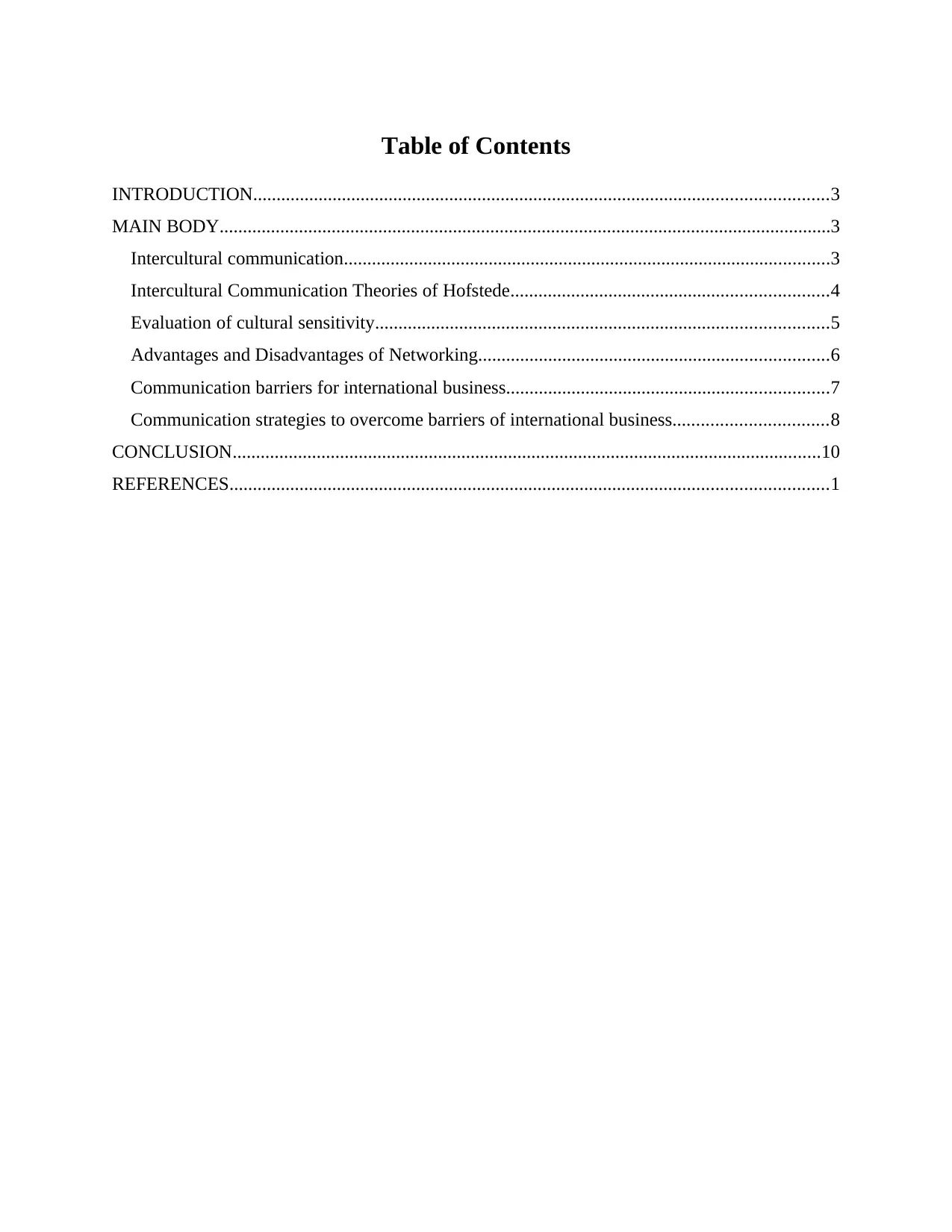
Table of Contents
INTRODUCTION...........................................................................................................................3
MAIN BODY...................................................................................................................................3
Intercultural communication........................................................................................................3
Intercultural Communication Theories of Hofstede....................................................................4
Evaluation of cultural sensitivity.................................................................................................5
Advantages and Disadvantages of Networking...........................................................................6
Communication barriers for international business.....................................................................7
Communication strategies to overcome barriers of international business.................................8
CONCLUSION..............................................................................................................................10
REFERENCES................................................................................................................................1
INTRODUCTION...........................................................................................................................3
MAIN BODY...................................................................................................................................3
Intercultural communication........................................................................................................3
Intercultural Communication Theories of Hofstede....................................................................4
Evaluation of cultural sensitivity.................................................................................................5
Advantages and Disadvantages of Networking...........................................................................6
Communication barriers for international business.....................................................................7
Communication strategies to overcome barriers of international business.................................8
CONCLUSION..............................................................................................................................10
REFERENCES................................................................................................................................1
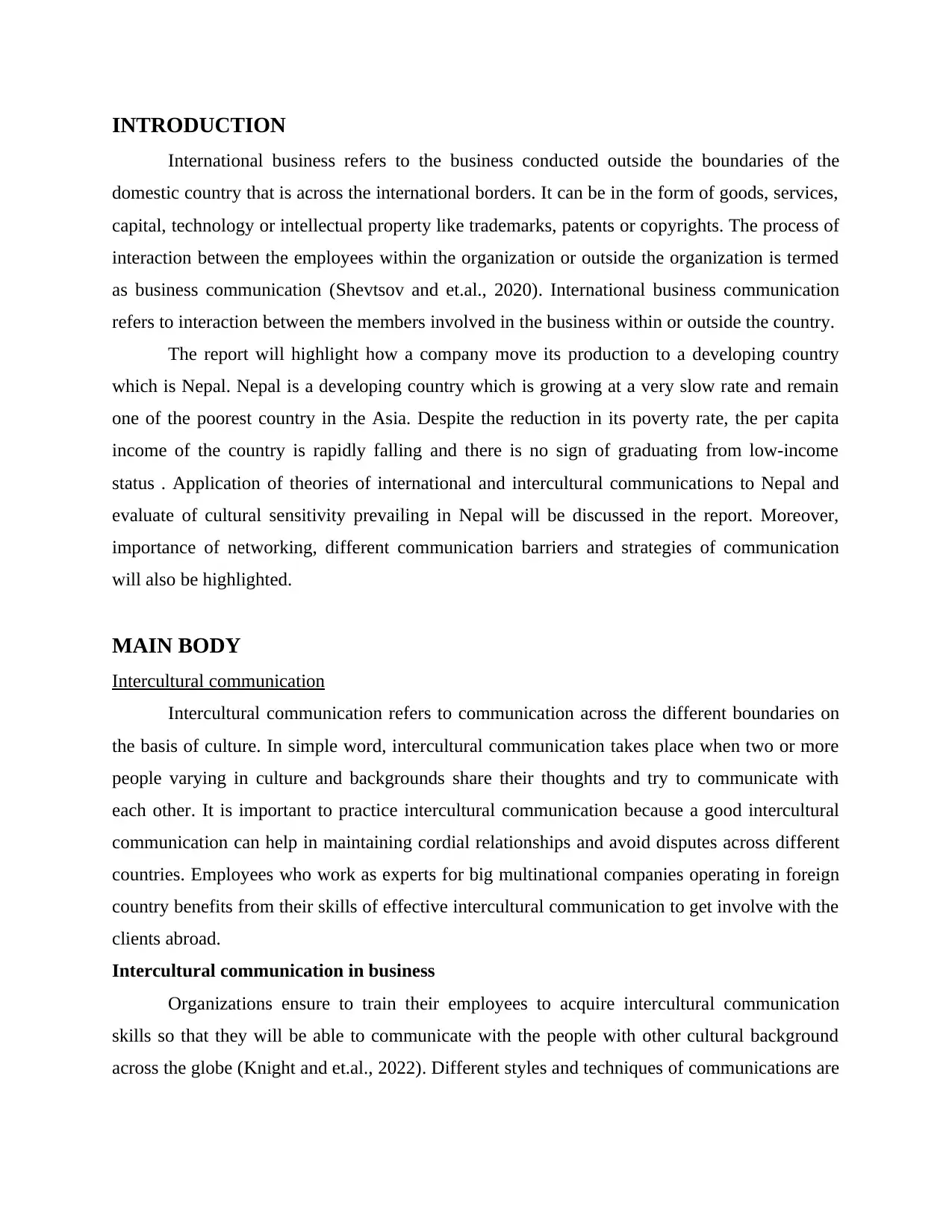
INTRODUCTION
International business refers to the business conducted outside the boundaries of the
domestic country that is across the international borders. It can be in the form of goods, services,
capital, technology or intellectual property like trademarks, patents or copyrights. The process of
interaction between the employees within the organization or outside the organization is termed
as business communication (Shevtsov and et.al., 2020). International business communication
refers to interaction between the members involved in the business within or outside the country.
The report will highlight how a company move its production to a developing country
which is Nepal. Nepal is a developing country which is growing at a very slow rate and remain
one of the poorest country in the Asia. Despite the reduction in its poverty rate, the per capita
income of the country is rapidly falling and there is no sign of graduating from low-income
status . Application of theories of international and intercultural communications to Nepal and
evaluate of cultural sensitivity prevailing in Nepal will be discussed in the report. Moreover,
importance of networking, different communication barriers and strategies of communication
will also be highlighted.
MAIN BODY
Intercultural communication
Intercultural communication refers to communication across the different boundaries on
the basis of culture. In simple word, intercultural communication takes place when two or more
people varying in culture and backgrounds share their thoughts and try to communicate with
each other. It is important to practice intercultural communication because a good intercultural
communication can help in maintaining cordial relationships and avoid disputes across different
countries. Employees who work as experts for big multinational companies operating in foreign
country benefits from their skills of effective intercultural communication to get involve with the
clients abroad.
Intercultural communication in business
Organizations ensure to train their employees to acquire intercultural communication
skills so that they will be able to communicate with the people with other cultural background
across the globe (Knight and et.al., 2022). Different styles and techniques of communications are
International business refers to the business conducted outside the boundaries of the
domestic country that is across the international borders. It can be in the form of goods, services,
capital, technology or intellectual property like trademarks, patents or copyrights. The process of
interaction between the employees within the organization or outside the organization is termed
as business communication (Shevtsov and et.al., 2020). International business communication
refers to interaction between the members involved in the business within or outside the country.
The report will highlight how a company move its production to a developing country
which is Nepal. Nepal is a developing country which is growing at a very slow rate and remain
one of the poorest country in the Asia. Despite the reduction in its poverty rate, the per capita
income of the country is rapidly falling and there is no sign of graduating from low-income
status . Application of theories of international and intercultural communications to Nepal and
evaluate of cultural sensitivity prevailing in Nepal will be discussed in the report. Moreover,
importance of networking, different communication barriers and strategies of communication
will also be highlighted.
MAIN BODY
Intercultural communication
Intercultural communication refers to communication across the different boundaries on
the basis of culture. In simple word, intercultural communication takes place when two or more
people varying in culture and backgrounds share their thoughts and try to communicate with
each other. It is important to practice intercultural communication because a good intercultural
communication can help in maintaining cordial relationships and avoid disputes across different
countries. Employees who work as experts for big multinational companies operating in foreign
country benefits from their skills of effective intercultural communication to get involve with the
clients abroad.
Intercultural communication in business
Organizations ensure to train their employees to acquire intercultural communication
skills so that they will be able to communicate with the people with other cultural background
across the globe (Knight and et.al., 2022). Different styles and techniques of communications are

used by companies to enhance the intercultural communication process and organize training
programmes to implement the techniques effectively as well as efficiently.
Intercultural Communication Theories of Hofstede
Intercultural communication theories of Hofstede helps to acquire full knowledge on the
cultures prevailing in different nations or in the nations where the firm is operating. It allows the
experts to compare different cultures and their dimensions. Following is the theory of
intercultural communication proposed by Hofstede:
Power Distance
The particular theory deals with the attitude of culture towards the idea that the persons in
the society are unequal. Power distance theory is defined as the fact about the limit till which the
organizations or community within a country accept or expect the ideas that the power is
distributed unequally.
Nepal is country which follows the hierarchical order , that is, every person in the country
has their own position and they enjoy several rights in context to that position. When there is
hierarchy in an organization, there is inherent inequality and the subordinated expects to be told
what they need to perform and all the authority is in the hands of the actual boss.
Individualism
In a society which is individualistic, the members focus on themselves and their close
connections but in the collective societies people look after themselves as well as societies in
exchange for loyalty. It raise the question that are the people referring themselves as “I” or
“We”. The amount of interdependency among the members of the society that is maintained by
the people of the society is defined in this theory (Pirlog, 2020).
Nepal has a low core of 30 which depicts that the country is a collective society. This can
be proved by the connections with the family and relationships. Loyalty is something which is
exchanged in a collective society and is considered above all the rules and regulations of the
society. In this type of society, people take in-charge for the responsibilities of other members in
the group. Hiring and promotions in an organization contribute to the management of groups.
Masculinity
This theory is a system of value that continues throughout the organizational life of the
firm. Masculine theory defines that the society is competent, successful and the success is
defined by the most successful or best person in the field. A feminine society is defined as the
programmes to implement the techniques effectively as well as efficiently.
Intercultural Communication Theories of Hofstede
Intercultural communication theories of Hofstede helps to acquire full knowledge on the
cultures prevailing in different nations or in the nations where the firm is operating. It allows the
experts to compare different cultures and their dimensions. Following is the theory of
intercultural communication proposed by Hofstede:
Power Distance
The particular theory deals with the attitude of culture towards the idea that the persons in
the society are unequal. Power distance theory is defined as the fact about the limit till which the
organizations or community within a country accept or expect the ideas that the power is
distributed unequally.
Nepal is country which follows the hierarchical order , that is, every person in the country
has their own position and they enjoy several rights in context to that position. When there is
hierarchy in an organization, there is inherent inequality and the subordinated expects to be told
what they need to perform and all the authority is in the hands of the actual boss.
Individualism
In a society which is individualistic, the members focus on themselves and their close
connections but in the collective societies people look after themselves as well as societies in
exchange for loyalty. It raise the question that are the people referring themselves as “I” or
“We”. The amount of interdependency among the members of the society that is maintained by
the people of the society is defined in this theory (Pirlog, 2020).
Nepal has a low core of 30 which depicts that the country is a collective society. This can
be proved by the connections with the family and relationships. Loyalty is something which is
exchanged in a collective society and is considered above all the rules and regulations of the
society. In this type of society, people take in-charge for the responsibilities of other members in
the group. Hiring and promotions in an organization contribute to the management of groups.
Masculinity
This theory is a system of value that continues throughout the organizational life of the
firm. Masculine theory defines that the society is competent, successful and the success is
defined by the most successful or best person in the field. A feminine society is defined as the
Secure Best Marks with AI Grader
Need help grading? Try our AI Grader for instant feedback on your assignments.

society in which quality of life is defined as the sign of success and lack of participation is
unacceptable. Masculine society means whether the person is motivated to be the best and on the
other hand feminine society means whether the person is motivated for liking what he/she do.
Nepal has score of 40 and therefore considered as the feminine society. In these types of
societies the priority is work for living. People value equality, solidarity and treat every one
equal in their professional lives. They compromise and negotiate whenever any disputes arises.
People favour flexibility in their lives and benefits such as free time. Their prime focus is on
well-being of the society as a whole.
Uncertainty Avoidance
This theory deals with the fact that the future is uncertain and cannot be known to
anyone. Various cultures have found ways to deal with the anxiety arising due to this uncertainty
(Jumayev, 2021). The score of uncertainty depicts the limit till which the persons from different
cultures feels insecure about the unknown situations and find techniques to avoid these
insecurities.
Nepal has only scored 40 in avoiding the uncertainty. There are no emotional sentiments
shown in the society relating to this dimension. Due to this there is a need of experts. People in
Nepal are relaxed and do not focus much on the stress caused (Akpovo and et.al., 2020). The
rules are very flexible in nature and the world is treated as helpful and kind. They try to accept
the innovation of products and try different things whether it relates to the technology.
Evaluation of cultural sensitivity
There are different kinds of people in the society following different cultures which makes it
important to understand about the different cultures as they are closely related with them.
Emotional attachment relating to a culture must be known. Some things are acceptable in one
country and the same are unacceptable in another country because of difference in the culture.
Difference between the cultures of the people bring communication gap between them.
Businesses in Nepal try to adapt to the different cultures and lifestyles of the country in which
they are operating. For the business to be successful it is important to learn and understand about
the cultures as it indicates signs of healthy relationships among employees.
Business culture in Nepal
unacceptable. Masculine society means whether the person is motivated to be the best and on the
other hand feminine society means whether the person is motivated for liking what he/she do.
Nepal has score of 40 and therefore considered as the feminine society. In these types of
societies the priority is work for living. People value equality, solidarity and treat every one
equal in their professional lives. They compromise and negotiate whenever any disputes arises.
People favour flexibility in their lives and benefits such as free time. Their prime focus is on
well-being of the society as a whole.
Uncertainty Avoidance
This theory deals with the fact that the future is uncertain and cannot be known to
anyone. Various cultures have found ways to deal with the anxiety arising due to this uncertainty
(Jumayev, 2021). The score of uncertainty depicts the limit till which the persons from different
cultures feels insecure about the unknown situations and find techniques to avoid these
insecurities.
Nepal has only scored 40 in avoiding the uncertainty. There are no emotional sentiments
shown in the society relating to this dimension. Due to this there is a need of experts. People in
Nepal are relaxed and do not focus much on the stress caused (Akpovo and et.al., 2020). The
rules are very flexible in nature and the world is treated as helpful and kind. They try to accept
the innovation of products and try different things whether it relates to the technology.
Evaluation of cultural sensitivity
There are different kinds of people in the society following different cultures which makes it
important to understand about the different cultures as they are closely related with them.
Emotional attachment relating to a culture must be known. Some things are acceptable in one
country and the same are unacceptable in another country because of difference in the culture.
Difference between the cultures of the people bring communication gap between them.
Businesses in Nepal try to adapt to the different cultures and lifestyles of the country in which
they are operating. For the business to be successful it is important to learn and understand about
the cultures as it indicates signs of healthy relationships among employees.
Business culture in Nepal
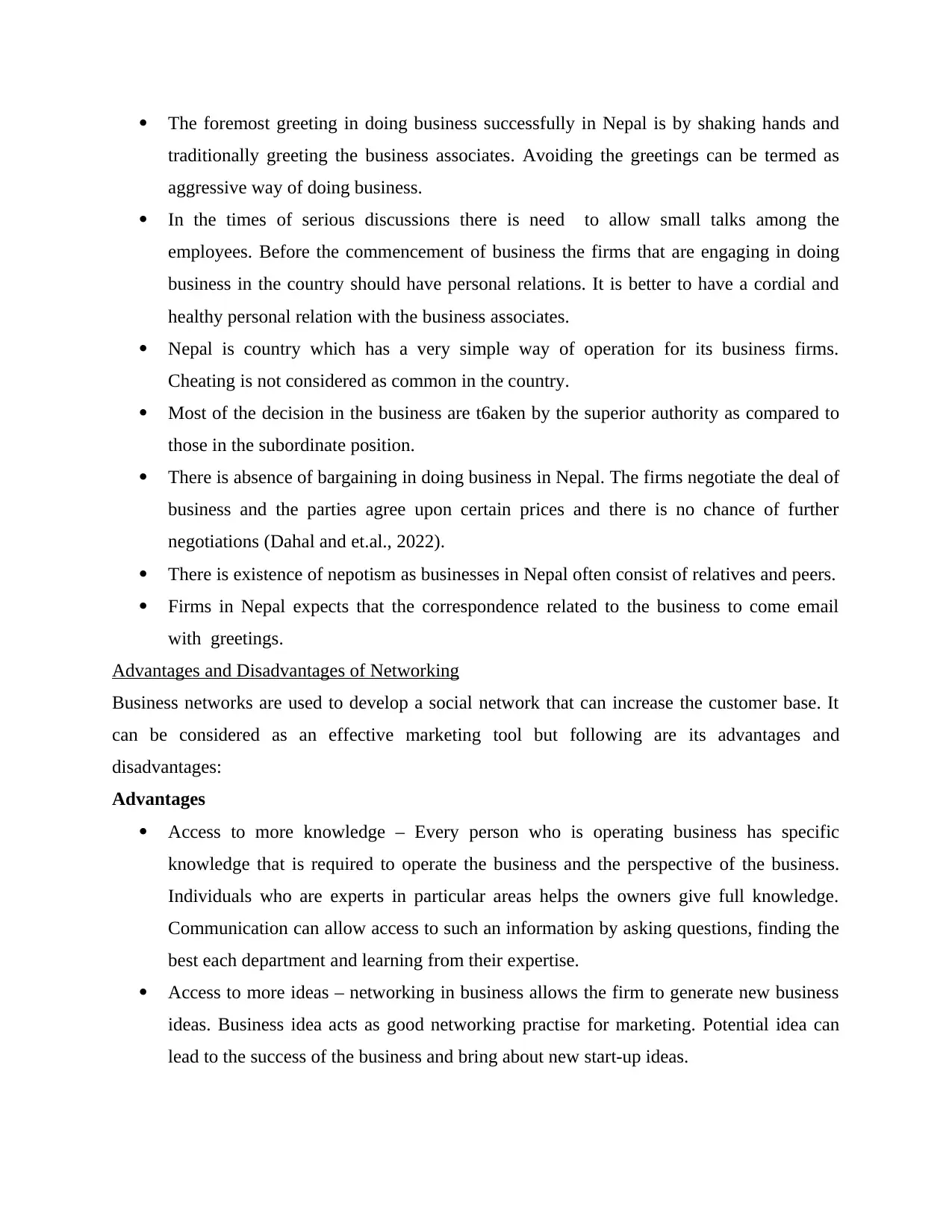
The foremost greeting in doing business successfully in Nepal is by shaking hands and
traditionally greeting the business associates. Avoiding the greetings can be termed as
aggressive way of doing business.
In the times of serious discussions there is need to allow small talks among the
employees. Before the commencement of business the firms that are engaging in doing
business in the country should have personal relations. It is better to have a cordial and
healthy personal relation with the business associates.
Nepal is country which has a very simple way of operation for its business firms.
Cheating is not considered as common in the country.
Most of the decision in the business are t6aken by the superior authority as compared to
those in the subordinate position.
There is absence of bargaining in doing business in Nepal. The firms negotiate the deal of
business and the parties agree upon certain prices and there is no chance of further
negotiations (Dahal and et.al., 2022).
There is existence of nepotism as businesses in Nepal often consist of relatives and peers.
Firms in Nepal expects that the correspondence related to the business to come email
with greetings.
Advantages and Disadvantages of Networking
Business networks are used to develop a social network that can increase the customer base. It
can be considered as an effective marketing tool but following are its advantages and
disadvantages:
Advantages
Access to more knowledge – Every person who is operating business has specific
knowledge that is required to operate the business and the perspective of the business.
Individuals who are experts in particular areas helps the owners give full knowledge.
Communication can allow access to such an information by asking questions, finding the
best each department and learning from their expertise.
Access to more ideas – networking in business allows the firm to generate new business
ideas. Business idea acts as good networking practise for marketing. Potential idea can
lead to the success of the business and bring about new start-up ideas.
traditionally greeting the business associates. Avoiding the greetings can be termed as
aggressive way of doing business.
In the times of serious discussions there is need to allow small talks among the
employees. Before the commencement of business the firms that are engaging in doing
business in the country should have personal relations. It is better to have a cordial and
healthy personal relation with the business associates.
Nepal is country which has a very simple way of operation for its business firms.
Cheating is not considered as common in the country.
Most of the decision in the business are t6aken by the superior authority as compared to
those in the subordinate position.
There is absence of bargaining in doing business in Nepal. The firms negotiate the deal of
business and the parties agree upon certain prices and there is no chance of further
negotiations (Dahal and et.al., 2022).
There is existence of nepotism as businesses in Nepal often consist of relatives and peers.
Firms in Nepal expects that the correspondence related to the business to come email
with greetings.
Advantages and Disadvantages of Networking
Business networks are used to develop a social network that can increase the customer base. It
can be considered as an effective marketing tool but following are its advantages and
disadvantages:
Advantages
Access to more knowledge – Every person who is operating business has specific
knowledge that is required to operate the business and the perspective of the business.
Individuals who are experts in particular areas helps the owners give full knowledge.
Communication can allow access to such an information by asking questions, finding the
best each department and learning from their expertise.
Access to more ideas – networking in business allows the firm to generate new business
ideas. Business idea acts as good networking practise for marketing. Potential idea can
lead to the success of the business and bring about new start-up ideas.
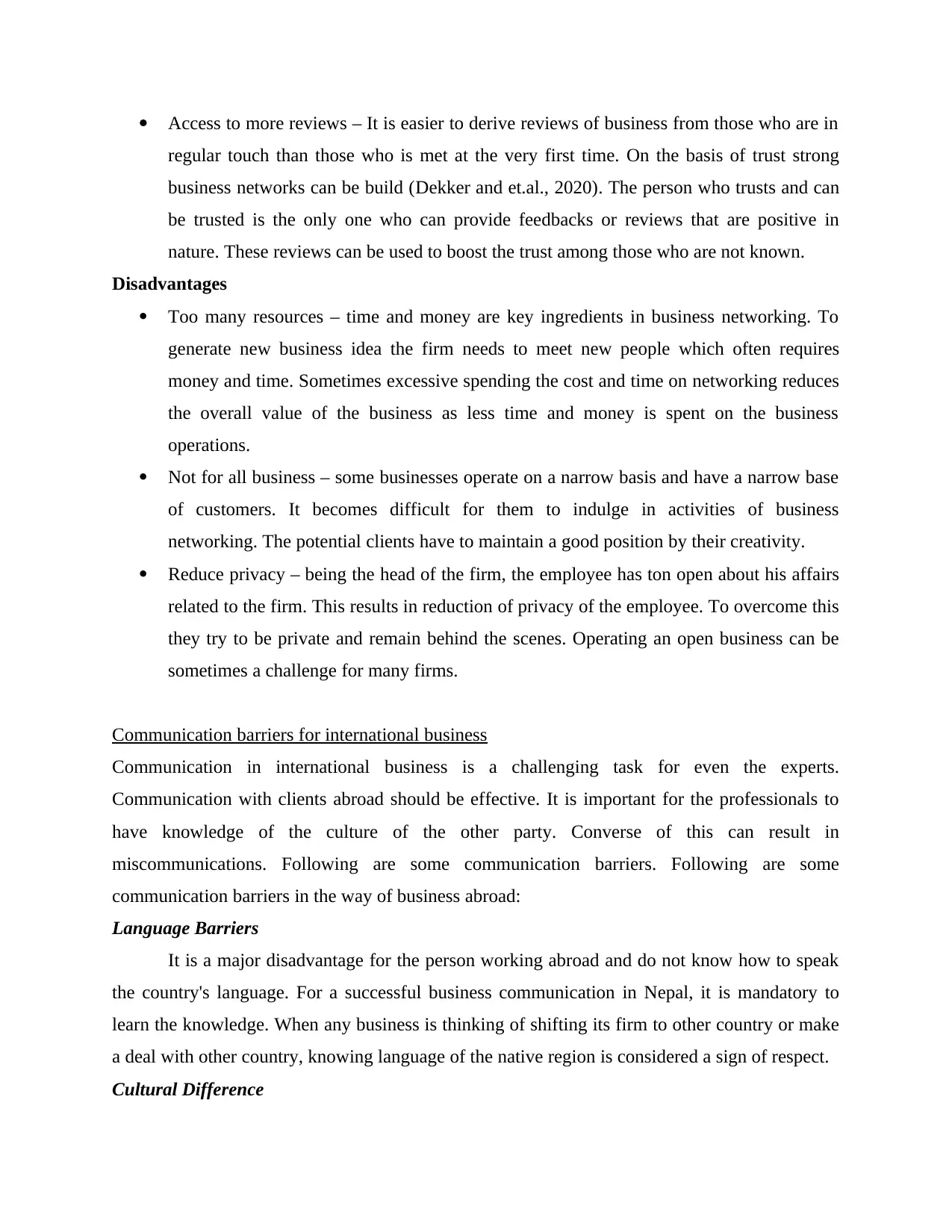
Access to more reviews – It is easier to derive reviews of business from those who are in
regular touch than those who is met at the very first time. On the basis of trust strong
business networks can be build (Dekker and et.al., 2020). The person who trusts and can
be trusted is the only one who can provide feedbacks or reviews that are positive in
nature. These reviews can be used to boost the trust among those who are not known.
Disadvantages
Too many resources – time and money are key ingredients in business networking. To
generate new business idea the firm needs to meet new people which often requires
money and time. Sometimes excessive spending the cost and time on networking reduces
the overall value of the business as less time and money is spent on the business
operations.
Not for all business – some businesses operate on a narrow basis and have a narrow base
of customers. It becomes difficult for them to indulge in activities of business
networking. The potential clients have to maintain a good position by their creativity.
Reduce privacy – being the head of the firm, the employee has ton open about his affairs
related to the firm. This results in reduction of privacy of the employee. To overcome this
they try to be private and remain behind the scenes. Operating an open business can be
sometimes a challenge for many firms.
Communication barriers for international business
Communication in international business is a challenging task for even the experts.
Communication with clients abroad should be effective. It is important for the professionals to
have knowledge of the culture of the other party. Converse of this can result in
miscommunications. Following are some communication barriers. Following are some
communication barriers in the way of business abroad:
Language Barriers
It is a major disadvantage for the person working abroad and do not know how to speak
the country's language. For a successful business communication in Nepal, it is mandatory to
learn the knowledge. When any business is thinking of shifting its firm to other country or make
a deal with other country, knowing language of the native region is considered a sign of respect.
Cultural Difference
regular touch than those who is met at the very first time. On the basis of trust strong
business networks can be build (Dekker and et.al., 2020). The person who trusts and can
be trusted is the only one who can provide feedbacks or reviews that are positive in
nature. These reviews can be used to boost the trust among those who are not known.
Disadvantages
Too many resources – time and money are key ingredients in business networking. To
generate new business idea the firm needs to meet new people which often requires
money and time. Sometimes excessive spending the cost and time on networking reduces
the overall value of the business as less time and money is spent on the business
operations.
Not for all business – some businesses operate on a narrow basis and have a narrow base
of customers. It becomes difficult for them to indulge in activities of business
networking. The potential clients have to maintain a good position by their creativity.
Reduce privacy – being the head of the firm, the employee has ton open about his affairs
related to the firm. This results in reduction of privacy of the employee. To overcome this
they try to be private and remain behind the scenes. Operating an open business can be
sometimes a challenge for many firms.
Communication barriers for international business
Communication in international business is a challenging task for even the experts.
Communication with clients abroad should be effective. It is important for the professionals to
have knowledge of the culture of the other party. Converse of this can result in
miscommunications. Following are some communication barriers. Following are some
communication barriers in the way of business abroad:
Language Barriers
It is a major disadvantage for the person working abroad and do not know how to speak
the country's language. For a successful business communication in Nepal, it is mandatory to
learn the knowledge. When any business is thinking of shifting its firm to other country or make
a deal with other country, knowing language of the native region is considered a sign of respect.
Cultural Difference
Paraphrase This Document
Need a fresh take? Get an instant paraphrase of this document with our AI Paraphraser

Some countries find the way in which other countries do their business abrasive
(Greenberg and et.al., 2022). Experts in Nepal find that it is the responsibility of the business
associates to know their clients on a personal level. Ignorance of the culture of the country the
business is operating can create a situation which might be disgraceful for the company.
Body Language
Some country's way of expressing can be rude for the other country and is not acceptable.
Persons who are communicating should be aware of the fact that they are communicating what is
being delivered. For example: in Nepal, looking superior in the eyes treats others as inferior. In
some countries avoiding eye contact can be a sign of low confidence.
Patience
Every good communicator has the quality of patience indulged within himself. Sometimes the
decisions by other firms operating outside the county can be delayed for some reason.
Employees have to be patience in order to deal with this barrier. Whenever there is involvement
of government in the business the decision can take time. It can be concluded by saying that
patience is a virtue.
Gender Bias
The society in Nepal is still male dominant, that is, males are preferred over female in
many areas. Male executives are least interested in doing business with the female candidates
and if they are forced to do it they do it by keeping grudges. If the business want to have good
and cordial relationships with the fellow clients effective communication must be recognized in
very field.
Insights
Best way to conduct business effectively and efficiently requires proper insights of the
culture and this can be gained through internet or surveys (Anwar and et.al., 2020). Finding ways
to know about the cultures of different countries of operations can lead to prevention of
embarrassment among the countries.
Communication strategies to overcome barriers of international business
Communication barriers can cause to misunderstanding which can further result in unclear
understanding of the message or information. Strategies which can overcome the communication
barriers in order to increase productivity are discussed below:
Flow of information
(Greenberg and et.al., 2022). Experts in Nepal find that it is the responsibility of the business
associates to know their clients on a personal level. Ignorance of the culture of the country the
business is operating can create a situation which might be disgraceful for the company.
Body Language
Some country's way of expressing can be rude for the other country and is not acceptable.
Persons who are communicating should be aware of the fact that they are communicating what is
being delivered. For example: in Nepal, looking superior in the eyes treats others as inferior. In
some countries avoiding eye contact can be a sign of low confidence.
Patience
Every good communicator has the quality of patience indulged within himself. Sometimes the
decisions by other firms operating outside the county can be delayed for some reason.
Employees have to be patience in order to deal with this barrier. Whenever there is involvement
of government in the business the decision can take time. It can be concluded by saying that
patience is a virtue.
Gender Bias
The society in Nepal is still male dominant, that is, males are preferred over female in
many areas. Male executives are least interested in doing business with the female candidates
and if they are forced to do it they do it by keeping grudges. If the business want to have good
and cordial relationships with the fellow clients effective communication must be recognized in
very field.
Insights
Best way to conduct business effectively and efficiently requires proper insights of the
culture and this can be gained through internet or surveys (Anwar and et.al., 2020). Finding ways
to know about the cultures of different countries of operations can lead to prevention of
embarrassment among the countries.
Communication strategies to overcome barriers of international business
Communication barriers can cause to misunderstanding which can further result in unclear
understanding of the message or information. Strategies which can overcome the communication
barriers in order to increase productivity are discussed below:
Flow of information
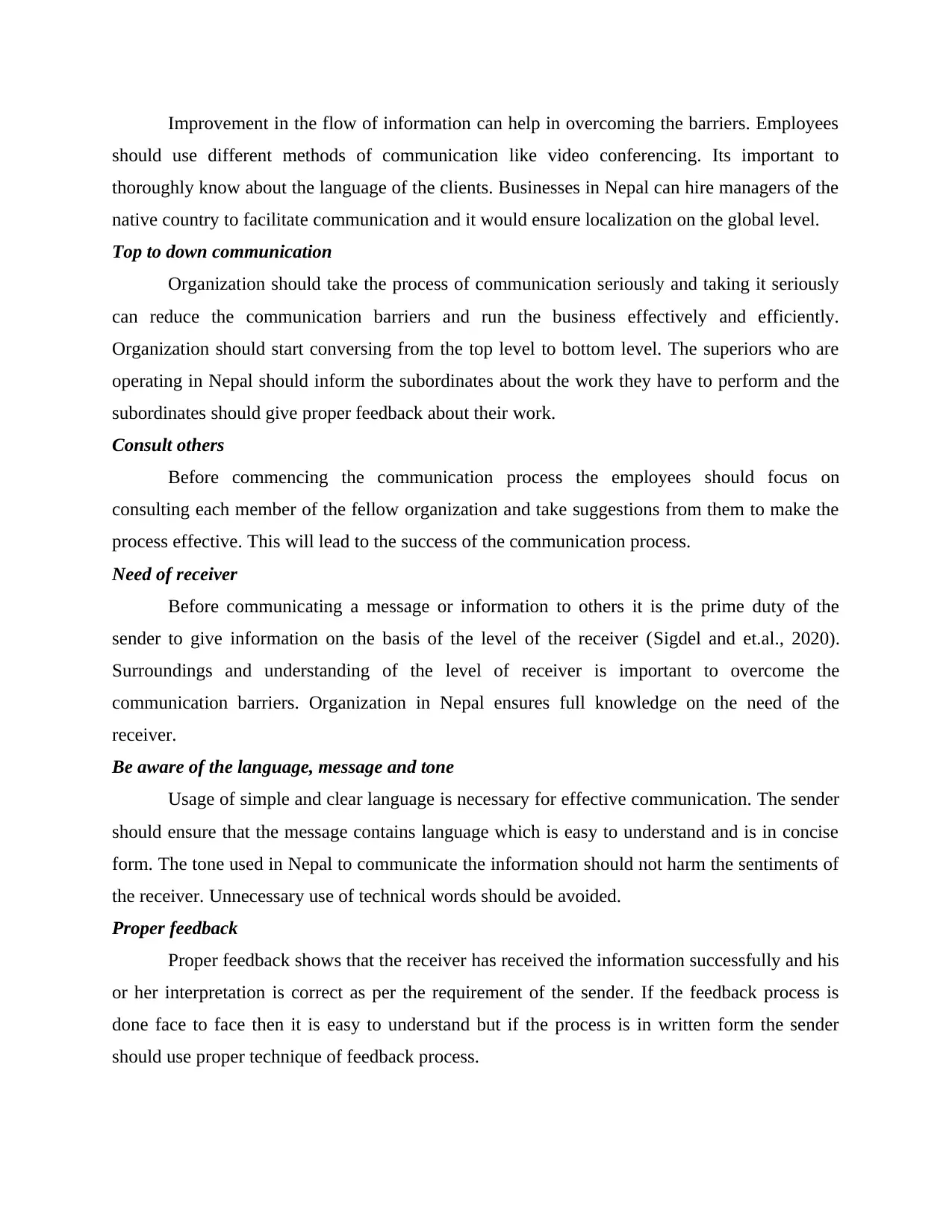
Improvement in the flow of information can help in overcoming the barriers. Employees
should use different methods of communication like video conferencing. Its important to
thoroughly know about the language of the clients. Businesses in Nepal can hire managers of the
native country to facilitate communication and it would ensure localization on the global level.
Top to down communication
Organization should take the process of communication seriously and taking it seriously
can reduce the communication barriers and run the business effectively and efficiently.
Organization should start conversing from the top level to bottom level. The superiors who are
operating in Nepal should inform the subordinates about the work they have to perform and the
subordinates should give proper feedback about their work.
Consult others
Before commencing the communication process the employees should focus on
consulting each member of the fellow organization and take suggestions from them to make the
process effective. This will lead to the success of the communication process.
Need of receiver
Before communicating a message or information to others it is the prime duty of the
sender to give information on the basis of the level of the receiver (Sigdel and et.al., 2020).
Surroundings and understanding of the level of receiver is important to overcome the
communication barriers. Organization in Nepal ensures full knowledge on the need of the
receiver.
Be aware of the language, message and tone
Usage of simple and clear language is necessary for effective communication. The sender
should ensure that the message contains language which is easy to understand and is in concise
form. The tone used in Nepal to communicate the information should not harm the sentiments of
the receiver. Unnecessary use of technical words should be avoided.
Proper feedback
Proper feedback shows that the receiver has received the information successfully and his
or her interpretation is correct as per the requirement of the sender. If the feedback process is
done face to face then it is easy to understand but if the process is in written form the sender
should use proper technique of feedback process.
should use different methods of communication like video conferencing. Its important to
thoroughly know about the language of the clients. Businesses in Nepal can hire managers of the
native country to facilitate communication and it would ensure localization on the global level.
Top to down communication
Organization should take the process of communication seriously and taking it seriously
can reduce the communication barriers and run the business effectively and efficiently.
Organization should start conversing from the top level to bottom level. The superiors who are
operating in Nepal should inform the subordinates about the work they have to perform and the
subordinates should give proper feedback about their work.
Consult others
Before commencing the communication process the employees should focus on
consulting each member of the fellow organization and take suggestions from them to make the
process effective. This will lead to the success of the communication process.
Need of receiver
Before communicating a message or information to others it is the prime duty of the
sender to give information on the basis of the level of the receiver (Sigdel and et.al., 2020).
Surroundings and understanding of the level of receiver is important to overcome the
communication barriers. Organization in Nepal ensures full knowledge on the need of the
receiver.
Be aware of the language, message and tone
Usage of simple and clear language is necessary for effective communication. The sender
should ensure that the message contains language which is easy to understand and is in concise
form. The tone used in Nepal to communicate the information should not harm the sentiments of
the receiver. Unnecessary use of technical words should be avoided.
Proper feedback
Proper feedback shows that the receiver has received the information successfully and his
or her interpretation is correct as per the requirement of the sender. If the feedback process is
done face to face then it is easy to understand but if the process is in written form the sender
should use proper technique of feedback process.

CONCLUSION
International business communication is similar to any type of business communication
but the only difference is that it is practised across cultures and borders. The above report
highlighted the theory of intercultural communication of Hofstede for the country Nepal and
about the country's cultural sensitivity. The study revealed about the country's culture and other
cultural dimensions. Importance of networking in the international business and its advantages
and disadvantages. Moreover, different communication barriers and strategies to overcome these
barriers were also highlighted.
International business communication is similar to any type of business communication
but the only difference is that it is practised across cultures and borders. The above report
highlighted the theory of intercultural communication of Hofstede for the country Nepal and
about the country's cultural sensitivity. The study revealed about the country's culture and other
cultural dimensions. Importance of networking in the international business and its advantages
and disadvantages. Moreover, different communication barriers and strategies to overcome these
barriers were also highlighted.
Secure Best Marks with AI Grader
Need help grading? Try our AI Grader for instant feedback on your assignments.

REFERENCES
Books and Journals
Akpovo and et.al., 2020. The Development of Intercultural Sensitivity and Cultural Empathy
During an International Student-Teaching Internship in Nepal. Critical Issues in Early
Childhood Teacher Education: Volume 2-International Perspectives, p.147.
Anwar and et.al., 2020. Managerial networking and business model innovation: Empirical study
of new ventures in an emerging economy. Journal of Small Business &
Entrepreneurship, 32(3), pp.265-286.
Dahal and et.al., 2022. Research integrity: learning from collective action in Nepal. Facets, 7(1),
pp.236-246.
Dekker and et.al., 2020. Social media adoption in the police: Barriers and strategies. Government
Information Quarterly, 37(2), p.101441.
Greenberg and et.al., 2022. Double-tier Business Networking in Rural and Urban Regions.
In Geography Research Forum (Vol. 41, pp. 28-49).
Jumayev, U., 2021. INTERCULTURAL DIFFERENCE PARAMETERS: HOFSTEDE AND
TROMPENAARS THEORIES. ЦЕНТР НАУЧНЫХ ПУБЛИКАЦИЙ (buxdu.
uz), 3(3).
Knight and et.al., 2022. Marketing Communications Strategy in Advanced and Emerging
Markets: An International Comparison. Journal of Comparative International
Management, 25(1), pp.125-143.
Pirlog, A., 2020. Intercultural “Diagnosis” of Management in the Republic of Moldova
According to Geert Hofstede Model: Comparative Analysis.
Shevtsov and et.al., 2020. Management of global marketing communications in the context of
international business. Economics & Education, 5(2), pp.90-95.
Sigdel and et.al., 2020. Effect of Corporate Social Responsibility on Firms Profitability: A Study
on Small and Medium Enterprises in Pokhara City, Nepal. International Business
Research, 13(10), pp.1-76.
Books and Journals
Akpovo and et.al., 2020. The Development of Intercultural Sensitivity and Cultural Empathy
During an International Student-Teaching Internship in Nepal. Critical Issues in Early
Childhood Teacher Education: Volume 2-International Perspectives, p.147.
Anwar and et.al., 2020. Managerial networking and business model innovation: Empirical study
of new ventures in an emerging economy. Journal of Small Business &
Entrepreneurship, 32(3), pp.265-286.
Dahal and et.al., 2022. Research integrity: learning from collective action in Nepal. Facets, 7(1),
pp.236-246.
Dekker and et.al., 2020. Social media adoption in the police: Barriers and strategies. Government
Information Quarterly, 37(2), p.101441.
Greenberg and et.al., 2022. Double-tier Business Networking in Rural and Urban Regions.
In Geography Research Forum (Vol. 41, pp. 28-49).
Jumayev, U., 2021. INTERCULTURAL DIFFERENCE PARAMETERS: HOFSTEDE AND
TROMPENAARS THEORIES. ЦЕНТР НАУЧНЫХ ПУБЛИКАЦИЙ (buxdu.
uz), 3(3).
Knight and et.al., 2022. Marketing Communications Strategy in Advanced and Emerging
Markets: An International Comparison. Journal of Comparative International
Management, 25(1), pp.125-143.
Pirlog, A., 2020. Intercultural “Diagnosis” of Management in the Republic of Moldova
According to Geert Hofstede Model: Comparative Analysis.
Shevtsov and et.al., 2020. Management of global marketing communications in the context of
international business. Economics & Education, 5(2), pp.90-95.
Sigdel and et.al., 2020. Effect of Corporate Social Responsibility on Firms Profitability: A Study
on Small and Medium Enterprises in Pokhara City, Nepal. International Business
Research, 13(10), pp.1-76.

2
1 out of 12
Related Documents
Your All-in-One AI-Powered Toolkit for Academic Success.
+13062052269
info@desklib.com
Available 24*7 on WhatsApp / Email
![[object Object]](/_next/static/media/star-bottom.7253800d.svg)
Unlock your academic potential
© 2024 | Zucol Services PVT LTD | All rights reserved.



